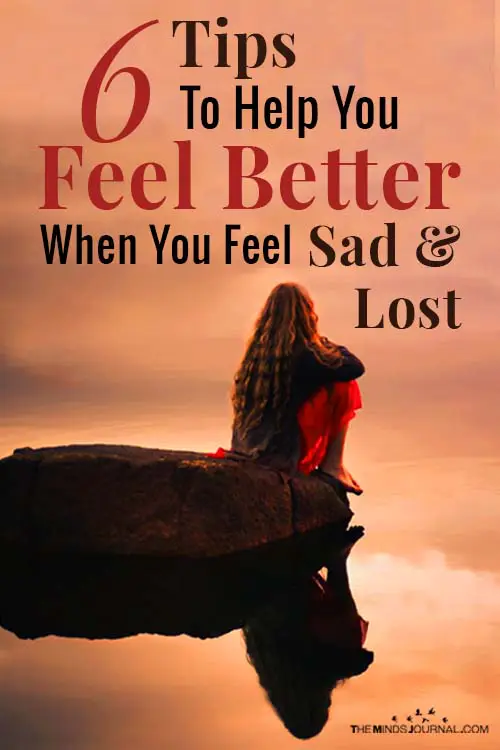Are you someone who when feels sad and depressed, finds it difficult to feel better and bring yourself out of those negative feelings?
Please help me … I am sad. I think I’m drowning, I don’t know what to do and I don’t know where to go. I feel suffocated and strangled by the weight of my emotions. I feel like I’m lost in this dark tunnel of excruciating pain that just doesn’t end. It just doesn’t go away.
I wrote these words as a teenager in a journal that I’ve long since left to collect dust, but the truth is that I still feel this way sometimes. I’ve often found myself returning back to that dark, consuming tunnel of emotions when I feel rejected, mistreated, misunderstood, lied to and slighted, and the same story tends to repeat itself over and over again:
Everything sucks. I will never feel happy again. Nobody can be trusted. Life is unfair.
Do you feel this way? Have you experienced the world crumbling down around you so suddenly that you don’t have time to even take a breath? Have you felt your emotions become so intense, so overwhelming within you that they seem to form a vortex; a black hole of despair?
I want you to know that although you might be suffering greatly right now, your suffering is not without a purpose or a meaning. We will explore what I mean by that together soon.

I Am Sad … What Can I Do to Feel Better?
You have come to this article to feel better. I understand that. And I welcome you to be gentle with yourself and learn as much as you can from this article. I am teaching you how to feel better because I have taught myself how to feel better; there is no other way that I could have written this article.
Like you, I have experienced a lot of pain in my life: emotional pain, psychological pain, and chronic physical pain. I am a wounded healer; a shamaness, in my own right, who has learned to transform my own pain into my own medicine. This sacred alchemical process would have never started so early in my life without the help of my teacher and Shaman, Mateo Sol.
Although I still feel the harsh stings of pain, I am learning to transform the experience into something for my benefit. “How is that even possible?” you might ask, “I am sad, terribly heart-broken … how on earth can that work for my benefit?” Well, I can attempt to show you how, but the rest is in your hands.
Here are a few key things I want you to know and/or put into practice to help yourself feel better:
1. Find a quiet place of solitude.
This might sound counter-intuitive, but in order to feel better, you need to take some time out from people and life. You might like to shut the door of your bedroom, go sit on a quiet park bench, take a solitary stroll, or find any other place that gives you time to think and process what you’ve experienced.
The more noise, disruptions, and distractions there are, the easier it is to get sucked into a mindless cycle of unquestioned misery.
2. Ask, “Is that true?”
Once you are quiet and still, you will naturally relive the moment, words, actions, situation, or person that brought you such great sadness and distress. Your mind will replay the moment over and over again because you are trying to understand it. Allow yourself to do this, but also realize that your mind will easily attach to any conclusion, assumption, or misconception that arises.
For example, you might instantly assume that the reason why your partner has criticized your weight is because they think you’re ugly and they don’t love you anymore. In this situation ask yourself, “Is that true? Do I really, truly know that this is true?” Likely, your answer will be “no, I don’t know whether it’s absolutely true or not.” This opens a space to consider other possibilities: perhaps they were insecure about their own weight, perhaps they were guilty about their own food choices that day, perhaps their snarkiness had nothing to do with you personally, and so forth.
I will use a personal example. Yesterday I received a strange email from an author I had been collaborating with on my book. This author had previously agreed to review my book, and when I asked whether they were happy for me to publish their review on the back cover, they said “yes.” However, all of a sudden I got a random email from them saying that they “don’t think we’re on the same page” and that they don’t want their review of my book to be published. That’s it. No explanation. No anything. Goodbye.
Naturally I was shocked and upset. My instant thought was, “they were only pretending to like my book; they gave it five stars, but they think it’s rubbish.” I then felt embarrassed, ashamed, hurt, and rejected. But I stopped. I saw the value in the experience and asked, “Is that true? Do I really know that they think my book is rubbish?” I don’t. Perhaps they didn’t really read it and felt embarrassed themselves? Perhaps they were envious of all the positive reviews it has received, or uncomfortable due to the impending spotlight they would receive? Who knows. But opening myself up to questioning my assumptions brought me great and surprising emotional release.
3. Face what you feel with courage. Stop running away.
When we feel intense emotional distress or discomfort, it is natural for every fiber of our beings to run away and hide. We do this by numbing out our emotions with TV, technology, drugs, alcohol, sex, friends and food, and by distracting ourselves as long as possible until the “bad feeling go away.” But they don’t. They are still there, lurking deep down, confined to the dark places of our shadow selves. As much as you think you can avoid what you feel, you can’t. It will always come back and haunt you in one form or another, often with even greater intensity. Eventually, after avoiding our emotions for so long, some of us even wind up with mental illnesses or chronic health conditions.
This is precisely why you need to face what you feel right now, with courage. If anything, thank yourself for your willingness to be strong and brave in the face of such great inner turmoil. Few people are like you in their willingness to do this.
After you have found a quiet place to sit or be still, you need to welcome the healing process. At the beginning of any kind of healing process, you need to acknowledge what happened and allow yourself to feel whatever it is you feel. For instance, you might feel ashamed, guilty, worthless, ugly, bad, scared or angry (or a combination of these feelings and many others). Be still and allow yourself to feel these fully. Let yourself get these sensations out of your system so they no longer pollute you. Cleanse yourself by surrendering to them.
This process might last an hour, or it might last an entire day or even longer. But honor yourself and your courage, and stick with it. It’s worth it.
Want to feel more courage in yourself? Read Top 22 Stephen Hawking Quotes and Lessons That Will Inspire You To Think Bigger and Never Get Discouraged In Life
4. Remind yourself that as much as you think you’re alone, you have a lot of company.
When we feel pain we often develop a very small, very victimized mindset of ourselves that sounds something like this, “ … I am sad. This is TERRIBLE. I don’t want to feel this way. I hate this. I never wanted this. Why me?” and so forth.
Naturally, we tend to focus so much on the source of our suffering, and our pain itself, that we develop a myopic perspective of life, believing that we are completely alone. Of course, this adds significantly to our pain.
The truth is that I am sad, you are sad, we are all sad at some point. We are all betrayed, we are all rejected, we are all mistreated. The sooner you remind yourself of that, the better you will be able to handle your sadness, and the less it will have a hold over you.
5. Everything passes away – and so does your sadness.
Tell me, what stays the same for eternity? Nothing does. And neither does your sadness. Just as the clouds roll through the sky and drift away, so too will your sadness eventually.
Although you are mourning now, in a day, week or year from now, this experience will be a passing memory. This may not help to immediately curb your pain, but it does help to reduce its severity and the level that it consumes you.
Want to know more about how everything is temporary? Read Mono No Aware: The Awareness Of The Impermanence of Things
6. Your pain is a harsh, but honest and powerful teacher. Use it. Here’s how:
It is easy to be a victim, it is easy to wallow in our pain, and to some extent, these are both necessary steps that we all undergo until we realize that they don’t serve us in any beneficial way.
For a long time, I’ve immediately reacted to any painful circumstance with emotional reaction, thinking that the world has ended and that nothing will ever be good again. But Sol has constantly said to me, “Why do you see this as something to be unhappy about? Why don’t you see it as a lesson instead that you can learn from?” Through time I have truly taken this piece of advice to heart, and it has revolutionized the way I see pain.
Pain can teach you a number of things; it can teach you ways to improve as a person; it can teach you about emotional resilience; it can teach you about your own unexplored vulnerabilities and core wounds; it can teach you wisdom, and it can teach you about how to be a more grounded person.
Without pain it would be impossible for us to understand pleasure. Without night it would be impossible for us to appreciate the day. This is the essence of Taoism: one is needed to balance the other.
Finally…
Although you experience pain, understand that you are not your pain. The more you identify with your pain and the more your pain becomes “you,” the more you suffer.
You are sad, I am sad, we are all sad. I welcome you to unleash your pain, even as a catharsis, in the comments below. I’d love to read the advice you have to give as well (which might help another greatly).
Originally appeared on – Loner Wolf
Sadness is a part and parcel of life, and you can never avoid it. But what you can do is know how to deal with it, and be okay with it. Never let your sadness define you or take control of your mind. See it as an old friend, learn all the valuable lessons it imparts to you, and try to move on.
If you want to know more about how you can feel better when you are sad, then check this video out below:










Leave a Reply
You must be logged in to post a comment.